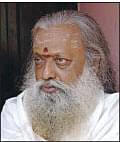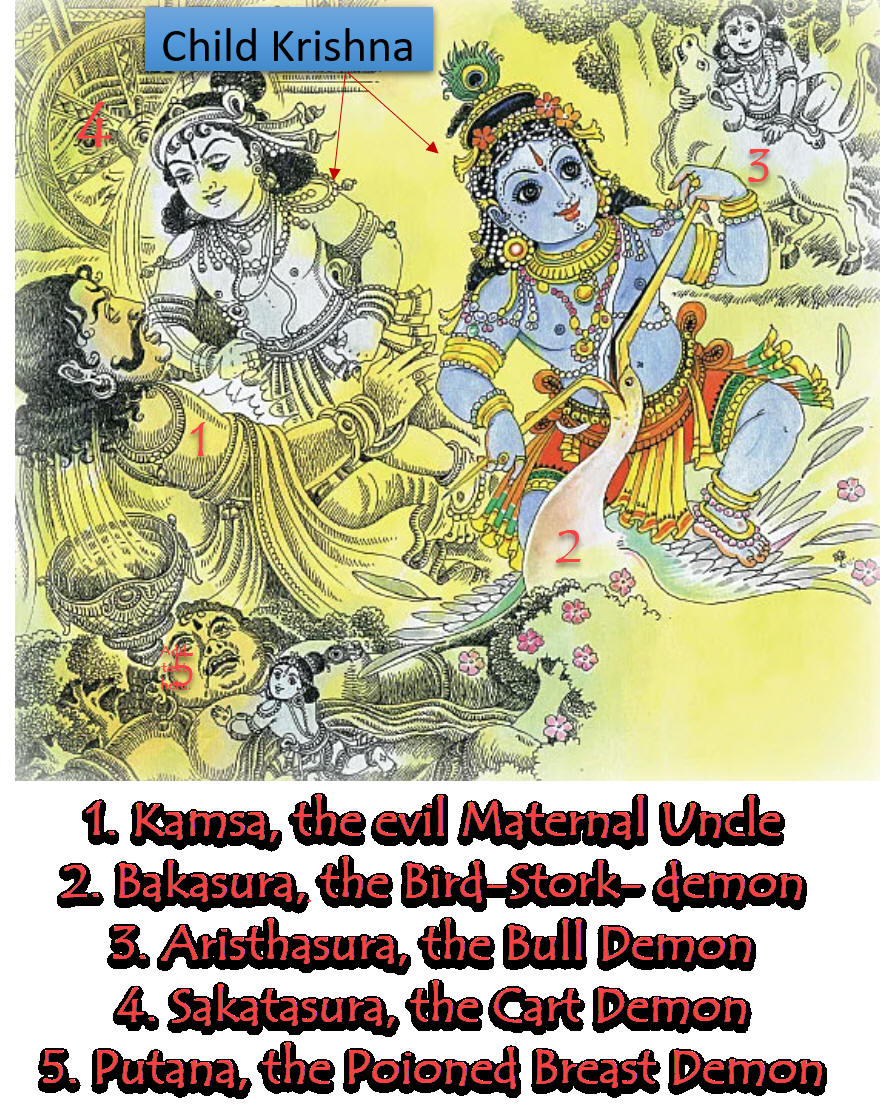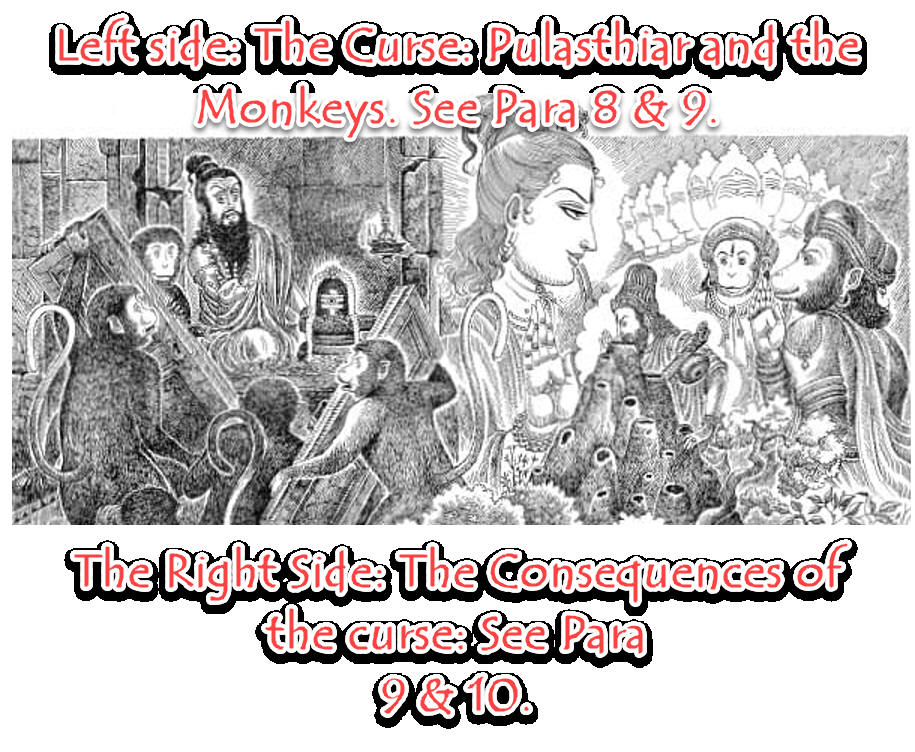Published:20 Jan 2014 7 PMUpdated:20 Jan 2014 7 PM Sakthi Vikatan
நாரதர் கதைகள் - 21 By Vikatan Correspondent

Autho: Wordsmith Balakumaran. Painting: Padmavasan
இது நான்கு வேத சாரம்எழுத்துச் சித்தர் பாலகுமாரன்; ஓவியம்: பத்மவாசன்
2. Naradar: So far, nothing new happened. Should anything new happen? Since you are the Creator God, could you tell me anything imminent and new happening?
3. Brahma: A battle is brewing.
Naradar: I see now! You can't keep quiet. You make your creations, and no one is cleverer than you to put one against the other and amuse yourself.
4. Brahma: Nothing of that sort, Narada. I don't create, just so they fight each other. All are my children. Growth and maturity are the portfolios of Vishnu. As they grow, things go awry. Tiger cub suckles at birth and, when grown up, goes hunting for the deer. Therefore, there is no fault in my creations. The Almighty Narayana makes some palpable mischief as my creations grow and says that such things become necessary in this world of motion and constant change.
5. Naradar: What things are they?
Brahma: I created Pulasthiar, who turned out to be a Mahan. Today, it is Sivaratri (the Night of Siva), and Pulasthiar will be doing Sivapuja. For such worship, he is in search of a temple.
6. Naradar: That sounds like a good idea. What is wrong with it? Where is the trouble in it?
Brahma: Trouble is brewing elsewhere. The Munis were discussing the greatness of Sivaratri. Some monkeys at the top branches of a tree came down, sat a distance from the Munis, and listened reverentially what the Munis said of the greatness. Discovering that monkeys were the attentive and captive audience, the Munis discussed their topic more extensively. They explained Sivam has in its heart, noble ideas such as welfare and wellness of all life forms.
7. Naradar: Adada (Blimy, surprise), wonderful! Once all life forms discover the need for Siva, there is no greater boon in this world. Long live the world. Where is the trouble here?
Brahma: See it for yourself.
Brahma and Naradar looked at the Bhuloka (earth).
Pulasthiar chose a Siva temple, shut the door of the sanctum sanctorum to do worship in the middle of the night.

8. The monkeys were in search of a temple to no avail. Time was running out, and there was no time to look for another temple. To open the locked temple doors, they broke the doors of the temple and the sanctum sanctorum.
Pulasthiar: Pulasthiar became angry and said, "What is this? Preventing the peaceful performance of Puja, you monkeys, don’t show me your simian antics. Here, I cast on you all a curse for interfering with the Puja."
That made the monkeys angry.
The monkeys: O Pulasthiare! We are not here looking for food to eat, a place to sleep or a chance to make mischief. We came here to do Siva Puja just like you. We did not know you were inside, and so, broke down the doors. Why did you cast a curse on us for our inadvertent mistake? If you kept the doors open, we would have left knowing you are inside. You are the cause of our mistake. We counter-curse you. In your next birth, we will destroy you and your family. That is a promise.

Naradar was in a panic.
In the next birth, Visravas and Kaikasi had two sons: Ravana and Kumbakarna. Visravas was the son of Pulasthiar. The present-day monkeys will be in the next birth Sugriva, Hanuman, Angatan, and the other Vanaras (monkey-men). To destroy Ravana from the Pulasthiar family, Tirumal will be the Avatara of Rama.
Naradar: Is that so? I must tell this to somebody.
Below a tree, there was an anthill. Naradar put his mouth and announced loudly, assuming some Tapasvin might be inside, what would happen in the future. This way, he felt lighter by telling someone the catastrophic events.
10. A long time later, the anthill crumbled, with the emergence of a Muni from inside the anthill, who was no other than Valmiki, the author and composer of Ramayana.
11. Naradar is beyond time and a witness to multiple Avataras. His birth coincided with the earth's appearance, and he went around it even to this day, still playing on his stringed instrument, Yazh. He is the eternal witness to the earth's events.
12. After the battle with Kamsa, Krishna Bhagavan was weary, his thoughts were far off, and his countenance was dull.
Naradar came to Krishna's court, paid homage, and played Narayana Ghanam, which made Krishna's face blossom.
Krishna: Narada! Do you know the events that took place here?
Naradar: Yes, I know them well. I have been watching you since your birth. You were the eighth-born son of Vasudeva, but your father moved you to Yadhavas' palace soon after birth. A newborn girl took your place in the jailhouse of your parents as arranged by your father. Kamsa, your maternal uncle, ran to the jailhouse and, not knowing the gender of the child, dashed her against the wall with intent to kill her.
13. Devaki cried, saying, "My brother, please let this child go."
Kamsa rejected her plea and, in a fit of anger, lifted the infant girl to dash her on the wall, but the girl slipped from his hand, negotiated her way between the two iron bars of the prison gate, and flew away.
The infant: "Adey (Hey) Kamsa! You cannot kill me. I am Sakthi." So saying, she revealed her true form: Eight hands, long tongue, long fangs, black body, red eyes, and a raised spear.
She warned Kamsa, "You cannot kill me, but a child will kill you. That killer child is living elsewhere in this world. Your (dying) time on earth is closing in on you. Look for him and engage in a fight with him." Sakthi laughed loudly.
14. Kamsan trembled in terror. Sakthi disappeared. Krishna's mother Devaki felt peaceful.
Kamsa: "Where is that child?" Repeating those words, Kamsa ran all over town looking for the child who vanished into thin air. He heard by gossip that a Yadhava boy, born in the Yadhava family, was doing many wondrous things, he sent his minions to find and kill the boy. The Asura minions went in many guises to kill him: A nursing ogress, Sakatasuran, and more.
Naradar: Krishna! When you were an infant, you sucked an ogress's poisonous breasts and killed her. You kicked the Sakatasuran and killed him. Your foe Kamsa came to know of the deaths of his minions. Knowing he could not kill you where you lived, he declared a truce and invited you to his place, which you accepted. You took your brother Balarama with you. The Yadhava families worried, but the Kamsa's subjects were happy.
15. You bent, broke, and threw away the massive bow at the palace entrance. You ripped off the fort's doors and beat up on the enormous, tusked elephants. You pinned him down with your foot on his neck, stepped on his heart, making him spit blood, and caused Kamsa's death. Peace of mind descended on the world. Your parents were happy. The people enjoyed liberation from the tyrant. With all your successes, why do you carry a withered look? Is it fatigue? Is it something else?
16. Krishna: "Narada! You are not here to discover the answers. You know them already. Whatever it is, Kamsa was my maternal uncle, to whom I owe my homage, a proper courtesy. After the parents, one's most significant relative is the uncle. I destroyed the prospect that Kamsa's daughter would be my traditional promised bride. I stomped my uncle and killed him. Is it not a sin? What should I do to expiate that sin?
Naradar laughed out loud.
17. Being the omnipotent Avatar of Narayana, the purpose of your Avatar is to kill the evil people, protect the virtuous, and establish Satya. Krishna! You have no blots, no sins, and beyond everything. You know this, but you ask me to give you an answer and reconciliation acceptable to the townspeople. Therefore, I tell you. Setu sea is holy, a place of habitation, where the Pitrus or the dead ancestors assemble and where conveniences, as established by Rama, are available for their descent to contact the earth. O Krishna! Go to Rama Setu, take immersion in the sea and other water bodies, and perform Sivapuja. Certainly, Kamsa will attain peace, and your grief will find relief. You will feel the comfort that Setu can give you."
Narada's words turned prescient. When Krishna brought relief from Kamsa's mental pain, Ramasetu was the best place to offer comfort from despair to the good, the bad, the friend, the foe, the high, and the low. Those who performed the expiatory ceremony in Rama Setu will be at peace. This narration was Naradar's prophesied words of promise and assurance.
18. Naradar is showing the way not only to the Devas but also to the earthlings.
Narayana, Narayana.
The author: Narada's stories, long and short, exist. I have expounded on the most worthwhile stories to you. I even went beyond the stories to speak my mind.
Naradar is not a clown, as portrayed on the drama stage. He is an affable person, with ease of communication, an exemplar of Bakthi Marga (Devotional path) and Nama Japam (Recitation of Narayana's name).
Why is there a plethora of gods and Mahans in Sanathana Dharma? Though a multiplicity of gods exists, it did not change the people's attitude, who had listened to the tenets but went their way.
19. Sanatana Dharma is not a newly sprouted small flower plant, but its age is indeterminable. Since the Hindu religion has a long history, godlike Mahans helped elevate people to spiritual excellence. A good tree keeps yielding seeds, and the aerial roots become trees or support the heavy branches.
Why so many Mahans? It is like asking why a tree has so many aerial roots.